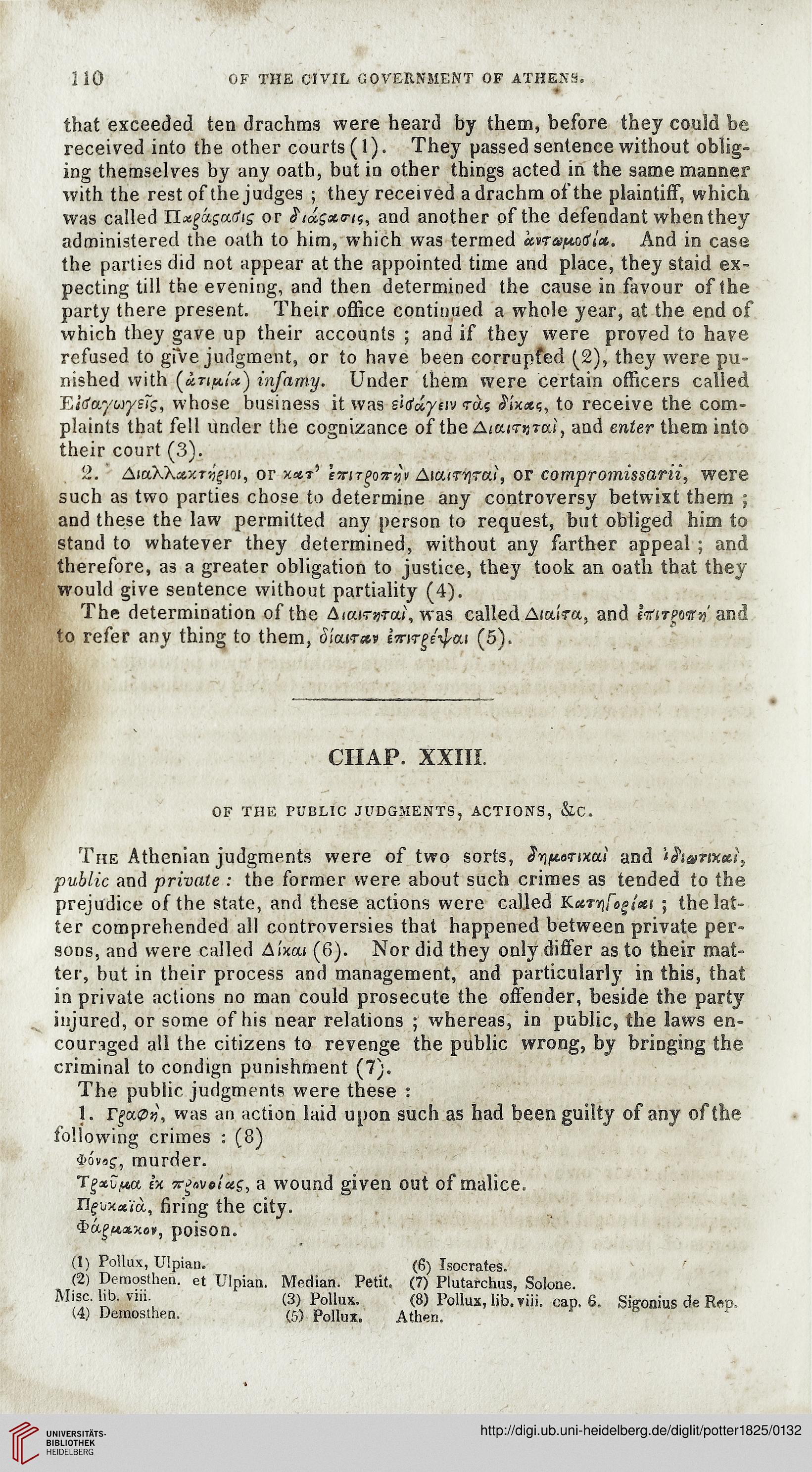110
of the civil government of athens.
that exceeded ten drachms were heard by them, before they could be
received into the other courts (1). They passed sentence without oblig-
ing themselves by any oath, but in other things acted in the same manner
with the rest of the judges ; they received a drachm of the plaintiff, which
was called Ilxgctgcuiig or ftagxtrts, and another of the defendant when they
administered the oath to him, which was termed kna^lx. And in case
the parties did not appear at the appointed time and place, they staid ex-
pecting till the evening, and then determined the cause in favour of the
party there present. Their office continued a whole year, at the end of
which they gave up their accounts ; and if they were proved to have
refused to give judgment, or to have been corrupfed (2), they were pu-
nished with infamy. Under them were certain officers called
EidayuysTg, whose business it was skdyav <rotj <5W?, to receive the com-
plaints that fell under the cognizance of the AiuiTK^at, and enter them into
their court (3).
2. AiaXkxxTvgtoi, or x*t' fjnr^oWn Aiacnjreu, or cornpromissarii, were
such as two parties chose to determine any controversy betwixt them ;
and these the law permitted any person to request, but obliged him to
stand to whatever they determined, without any farther appeal ; and
therefore, as a greater obligation to justice, they took an oath that they
would give sentence without partiality (4).
The determination of the AiaiTsjrai, was called AiaiVa, and fViTPOflV and
to refer any thing to them, Siourxv imrge'^ai (5).
CHAP. XXIII.
of the public judgments, actions, &.c.
The Athenian judgments were of two sorts, J^/uanxai and Wianxxi,
public and private : the former were about such crimes as tended to the
prejudice of the state, and these actions were called KxTrifoetxi ; the lat-
ter comprehended all controversies that happened between private per-
sons, and were called Aixcu (6). Nor did they only differ as to their mat-
ter, but in their process and management, and particularly in this, that
in private actions no man could prosecute the offender, beside the party
injured, or some of his near relations ; %vhereas, in public, the laws en-
couraged all the. citizens to revenge the public wrong, by bringing the
criminal to condign punishment (7).
The public judgments were these :
1. r^apij, was an action laid upon such as had been guilty of any of the
following crimes : (8)
#ova£, murder.
Tgxv/M & 7rJ/>vo!ctg, a wound given out of malice.
Ti^xxioL, firing the city.
Qagnxxo*, poison.
(1) Pollux, Ulpian. (6) Isocrates. '
(2) Demosthen. et Ulpian. Median. Petit. (7) Plutarchus, Solone.
Misc. lib. vni. (3) Pollux. (8) Pollux, lib. riii. cap. 6. Sigonius de Rm>,
(4) Demosthen. (5) Pollux. Athen.
of the civil government of athens.
that exceeded ten drachms were heard by them, before they could be
received into the other courts (1). They passed sentence without oblig-
ing themselves by any oath, but in other things acted in the same manner
with the rest of the judges ; they received a drachm of the plaintiff, which
was called Ilxgctgcuiig or ftagxtrts, and another of the defendant when they
administered the oath to him, which was termed kna^lx. And in case
the parties did not appear at the appointed time and place, they staid ex-
pecting till the evening, and then determined the cause in favour of the
party there present. Their office continued a whole year, at the end of
which they gave up their accounts ; and if they were proved to have
refused to give judgment, or to have been corrupfed (2), they were pu-
nished with infamy. Under them were certain officers called
EidayuysTg, whose business it was skdyav <rotj <5W?, to receive the com-
plaints that fell under the cognizance of the AiuiTK^at, and enter them into
their court (3).
2. AiaXkxxTvgtoi, or x*t' fjnr^oWn Aiacnjreu, or cornpromissarii, were
such as two parties chose to determine any controversy betwixt them ;
and these the law permitted any person to request, but obliged him to
stand to whatever they determined, without any farther appeal ; and
therefore, as a greater obligation to justice, they took an oath that they
would give sentence without partiality (4).
The determination of the AiaiTsjrai, was called AiaiVa, and fViTPOflV and
to refer any thing to them, Siourxv imrge'^ai (5).
CHAP. XXIII.
of the public judgments, actions, &.c.
The Athenian judgments were of two sorts, J^/uanxai and Wianxxi,
public and private : the former were about such crimes as tended to the
prejudice of the state, and these actions were called KxTrifoetxi ; the lat-
ter comprehended all controversies that happened between private per-
sons, and were called Aixcu (6). Nor did they only differ as to their mat-
ter, but in their process and management, and particularly in this, that
in private actions no man could prosecute the offender, beside the party
injured, or some of his near relations ; %vhereas, in public, the laws en-
couraged all the. citizens to revenge the public wrong, by bringing the
criminal to condign punishment (7).
The public judgments were these :
1. r^apij, was an action laid upon such as had been guilty of any of the
following crimes : (8)
#ova£, murder.
Tgxv/M & 7rJ/>vo!ctg, a wound given out of malice.
Ti^xxioL, firing the city.
Qagnxxo*, poison.
(1) Pollux, Ulpian. (6) Isocrates. '
(2) Demosthen. et Ulpian. Median. Petit. (7) Plutarchus, Solone.
Misc. lib. vni. (3) Pollux. (8) Pollux, lib. riii. cap. 6. Sigonius de Rm>,
(4) Demosthen. (5) Pollux. Athen.




